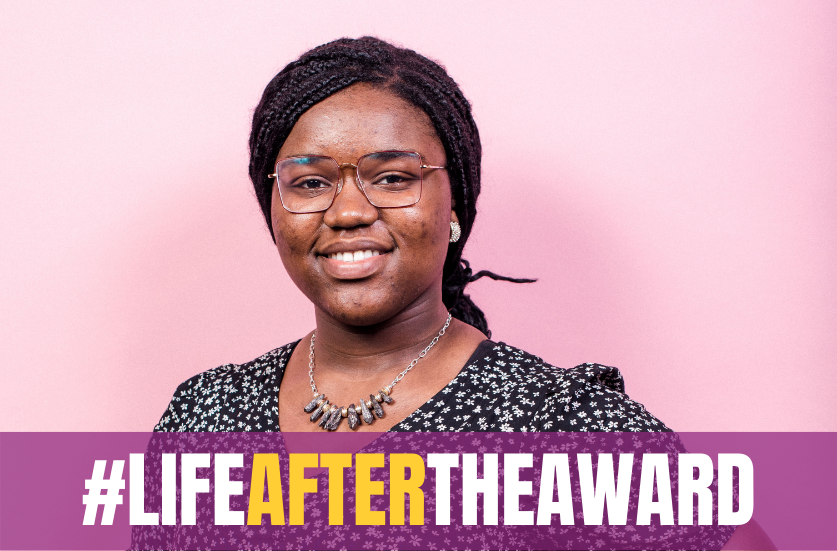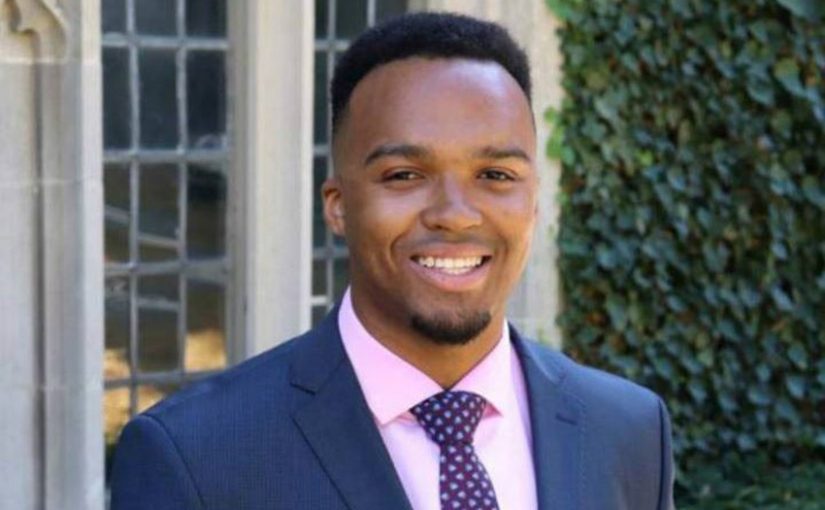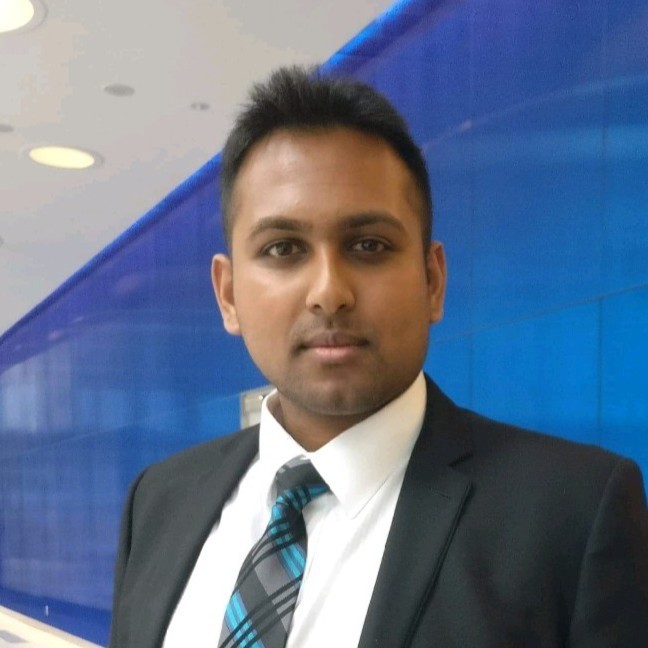Q&A with Nicholas Johnson
An Award Holder breaking boundaries and making history."I hope to inspire young people to achieve their goals and have the confidence to break barriers in doing so."
I hope to inspire young people to achieve their goals and have the confidence to break barriers in doing so.
Hailing from Montreal QC, Nicholas Johnson is an Award achiever who was recently catapulted into the history books as the first black valedictorian in Princeton University’s 274-year-history. Receiving congratulatory messages from the likes of former First Lady Michelle Obama (Princeton is her Alma Mater), Oprah Winfrey, and US senators such as Kamala Harris and Cory Booker, this accomplished young man remains humble with the growing media attention. Majoring in operations research and financial engineering at Princeton, Nicholas is planning to pursue his PhD in the fall at Massachusetts Institute of Technology in Boston. With a heart for helping others and making a difference, we had an opportunity to speak to Nicholas over the phone about what this honour means and how his Award journey helped prepare him to be world ready.
This interview has been edited for clarity.
Question:
Thank you for taking the time to chat with us today. I can only imagine how amazing and how overwhelming this moment in time is for you right now! Did you anticipate this kind of reaction to being named valedictorian? It is truly a historical moment.
Answer:
No, I did not anticipate this reaction by any means! I only learned I was the first black valedictorian in the University’s history roughly two weeks after I was first notified that I was the valedictorian for the class of 2020. And the way I found out was, I was being interviewed for a podcast being put on by the University and they informed me as the preface to a question. So, they really put me on the spot, it was a lot to grasp at that time. And then a friend of mine tweeted it on Twitter and that sparked a lot of the attention.
Question:
What are three words that describe how it feels being a Canadian breaking down racial barriers in America during today’s social/political climate?
Answer:
It certainly feels very empowering. I hope that it is inspirational to other individuals who are witnessing this event. It fills me with a lot of pride. So empowering, inspirational, and prideful. I think would be my three words.
Question:
You have achieved your Bronze and Silver level of the Award and we understand you are just about to submit your Gold.
Answer:
Yes, so I’m still working on finishing up the [Gold Award] paperwork and submitting it. I hope to be able to get that done this summer.
Question:
I guess it is safe to say that you were you completing your Gold Award while at Princeton?
Answer:
Yes it is! Some of the work I did during my first year at Princeton was a large part of my Gold [Award].
Question:
Can you share with us what kind of activities you did while at Princeton to complete your Gold Award?
Answer:
The main activity that stands out is my involvement with Engineers Without Borders. That was an organization that I was involved with directly for my first three years at Princeton. For my first two years, I worked as a member of the Peru team. We worked towards designing a gravity-fed water distribution system for a community in Pusunchás, Peru. A community of roughly 100 families that previously did not have access to a reliable source of clean water. During my first summer after beginning studies at Princeton, I had the chance to spend five weeks in Peru implementing a design that I had been working on at school. It was a significant event in my Princeton experience and in my life journey thus far. I really benefited from working with a team of students and a team of community partners from extremely diverse backgrounds, working towards this common goal, in an environment that was very unfamiliar to me. I am not fluent in Spanish by any means, so I had to pick up a significant amount of Spanish to prepare myself for that summer. It really was an incredible event.
Question:
Wow, so that project really marries three pillars of the Award. The skills you were learning through your Engineering studies enabled you to give back to a community through service and allowed you to complete your Gold project. Experiencing a brand-new environment for weeks on end, making a difference and impacting locals. It is an impactful moment in your life journey and really brought your Award journey together for you! You also just answered my next question which was going to be if there were any sections of the Award that made an impact on you that you want to share with us!
Answer:
I definitely think those 3 pillars: Community Service, Skill Development and my Gold Project. They were tied together very nicely in this project. It’s a project that’s very dear to my heart. The system was one that couldn’t be implemented over a single summer, so students from the team that returned to that same community over past summers. This most recent summer (after the summer of 2019), the entire project had been completed.
Question:
So how long in total were you working on this project?
Answer:
I was working directly on that project for my first two years at Princeton. My third year, I was still affiliated with Engineers Without Borders however I’d been elected as Co-President of Princeton’s chapter. So, I had primarily had administrative responsibilities that spanned across three Engineers Without Borders teams – each operating at Princeton. At the time, we had one project in Peru, (the project that I previously worked on) but also projects in Kenya and one project in the Dominican Republic. And then in my fourth year at Princeton, I served in an advisory capacity for the new co presidents [for the Princeton chapter of Engineers without Boarders].
Question:
So, it sounds like it evolved into a peer-to -peer mentoring opportunity for you as well.
Answer:
Very much so, both in the capacity of mentoring the incoming leadership team when it was my turn to transition out of leadership in the program. But also, with respects to incoming students at Princeton University, specifically incoming engineering students, who often try to find a good way to translate a lot of the more abstract concepts they learn during that first-year engineering curriculum into a more concrete project. And students often turn to Engineers Without Borders as a way to do that. I really spent a lot of my time interacting with these incoming students, learning about what they really want to get out of their engineering academic experience and seeing if Engineers Without Borders would be a good fit for them.
Question:
Reflecting back on time back at Princeton, especially being a Freshman in your first year, how did the Award help prepare you for being in this new environment, away from home in a new country? Are there any skills or attributes that you might have acquired during your Bronze and Silver journey that helped prepare you for this new endeavor?
Answer:
The short answer is yes, absolutely! I think that my Bronze and my Silver Award really helped me. Completing the steps that I took to reach those milestones really instilled in me, firstly a commitment to community engagement and giving back to the communities in which I’m apart of over the course of my life. I really took that to heart at Princeton. I strived to engage myself with both the Princeton community but also the community around Princeton. Coupled with that, I do think that the Duke of Ed Bronze and Silver levels also prepared me to have a certain comfort operating in environments that are foreign to me or that are different in environments in which I was raised. And I think that was absolutely instrumental in helping me transition into life at Princeton, life as a student living in the United States, as a young individual who wants to learn and also wants to contribute to the community that I was now a part of.
Question:
So that really highlights the importance of non-formal education. In this current global pandemic, how would you say that non-formal education coupled with academia are helping young people be set up for success for this new world that we’re living in right now?
Answer:
I think that formal academic training is of course very important. I believe that it’s extremely important in helping an individual realize their full potential. But in and of itself, it’s not enough. Formal academic training doesn’t really teach you to engage in your community. It doesn’t teach you to develop non-academic skills. It doesn’t necessary give you the competencies to become a leader in your field of choice. And I think that the COVID-19 pandemic has certainly illustrated several shortcomings and limitations of healthcare systems around the world, limitations in how we conduct our daily life, and limitations in the global supply scene for instance. And I think that in order to craft a better normal in the wake of COVID-19, one that hopefully isn’t as susceptible to a threat of this nature, will require very innovative new approaches to long lasting systems. Innovated approaches that both combine concepts that you might learn in an academic learning environment but also community engagement and community partnerships across academic disciplines, across fields of expertise. I do think a combination of those two pillars (academic learning and community engagement) will hopefully allow us, members of my generation to craft a better normal.
Question:
Is there anything that you can articulate that you’ve gained from doing the Award?
Answer:
I think I would speak again to facility [the ability to take action and to learn] and commitment to engaging with the communities that I’m a part of. Also, the facility to facilitate cross disciplinary partnerships, and cross-disciplinary initiatives with people from different academic backgrounds and also with people from different cultural backgrounds.
Question:
I know that you are working on your valedictorian speech right now and that you’re going to be presenting it on the 31st of May. Can you share with us a couple of the themes that you are hoping to relay to this graduating class of 2020 that also may resonate for young people across Canada and around the world?
Answer:
I’ve actually written the speech and pre-recorded it roughly a week ago. I think that one of the key ideas that I hope to convey in my speech is the notion of building. Building as a way to create and deliver value to the world and what the term building broadly defines. Not necessarily restricted to the building of physical structures, but recognizing communities are built, traditions are built, all sorts of things in the world need to be built. Coupled with that I also hope to motivate and inspire my classmates to have a certain confidence to attack the most pressing problems in the world in the wake of COVID-19. I think it is very easy to feel powerless in this very unique environment that we’re graduating into and I hope to motivate my classmates to not be frozen by that fear of the current environment.
Question:
What kind of change and impact do you think this moment in time will have for other young people of colour going forward?
Answer:
I hope that this achievement will ultimately be a source of inspiration for people of colour around the world who strive to achieve similar goals. Particularly those who have interest in pursuing education in a STEM field. I’m a very strong advocate for STEM education and the representation of minority groups in STEM. However, beyond that, I do hope to be a source of inspiration for all young individuals around the world, regardless of race, gender. Individuals who have high passions and who high goals. I hope to inspire them to achieve those goals and have the confidence to break barriers in doing so.
Question:
I think you are well on your way to that. You speak with a lot of passion; it just resonates in everything you say, and you can feel that it comes from your heart. It has been a pleasure speaking with you. Congratulations on what you have accomplished, it is a step in the right direction for all young people. We wish you the all the best and we look forward to following your journey.
Answer:
Thank you so much. I appreciate the support and it was great speaking with you both!
Share this...
More Stories Like This

Sarah
Gold Award HolderIt reminded me that it's never too late to learn something new, and I set myself the goal of acquiring a new skill every year.
Read More
Canadian Award Holders: Chimdinma Chijioke
Chimdinma Chijioke is an international student from Nigeria who started the Award program upon her arrival in Canada and completed the Silver Award in 2018.Chimdinma is thankful that the Award has helped her to make friends and adjust to life in Canada.
Read More
Vipul Gupta
Silver Award AchieverThis program taught me to manage my time effectively, be self-motivated and enjoy every moment for what it is worth, because moments like these don’t come back.
Read More
Jack
Bronze Achieve & Silver ParticipantEven though there were constant varieties of difficult challenges like fear of heights, unexpected minor injuries, we still kept our heads up and supported each other. There were moments that I wanted to give up, but with the teamwork and dedication, I continued to hike with a positive attitude.
Read More
Steven
Bronze Achiever & Silver ParticipantIt was truly an eye-opening and amazing experience to be fully immersed in nature. There were moments where I questioned my decision, but looking back now, going on the Journey was one of the best decisions of my life.
Read More
Eliza
Bronze, Silver & Gold AchieverI loved paddling right beside the rocks to gaze at the starfish and anemones! Each day, we explored new islands and discovered the significance they have to BC’s history.
Read More
